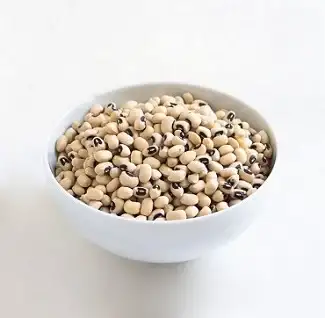Loading..

Black Eyed Beans
(Cowpeas / Chawli / Lobhia)
| Botanical Name | Vigna Uunguiculata |
| Family | Fabaceae |
| Form | Dried |
| Type Available | Whole |
| Color | Light |
| Packaging Size | 200 gm / 500 gm / 15 kg / 20 kg / 50 kg. |
| Bulk order are also available as per client's requirement. |
Black-Eyed Beans, also known as Black-Eyed Peas, Chawli, Lobia or Mulatto-Gelato are an excellent source of calcium, folate and vitamin A. In India, it is a subspecies of the cowpea, grown around the world for its medium-sized, edible bean.
Black-Eyed Beans are one of the most important food legume crops in the semi-arid tropics covering Asia, Africa, southern Europe and Central and South America. Black-Eyed Beans, a drought tolerant crop, has the unique ability to fix nitrogen even in very poor soils. It is also shade-tolerant and, therefore compatible as an intercrop with many cereals and root crops. Subsistence farmers in sub-Saharan Africa usually intercrop their cowpea with maize, sorghum, millet, and cassava.
Black-Eyed Beans are a common food item in the southern United States, where they are often called field peas. A subcategory of field peas is crowder peas, so called because they are crowded together in their pods, causing them to have squarish ends.
Black-Eyed Beans helps to improve digestion, increases folate Intake, prevents Anemia, Improves Skin & Eye Health, lowers Blood Pressure, etc.
Black-Eyed Beans have the highest percentage of calories from protein among vegetarian foods. Cowpea, an important legume in the tropics, has many uses. In fresh form, the young leaves, immature pods and peas are used as vegetables, while several snacks and main meal dishes are prepared from the grain. All parts of the plant that are used for food are nutritious, providing protein, vitamins (notably vitamin B) and minerals. The cowpea is a great source of livestock feed, and therefore of great value to farmers.
